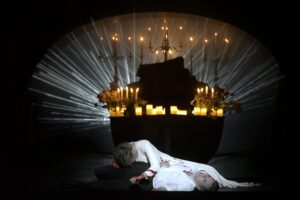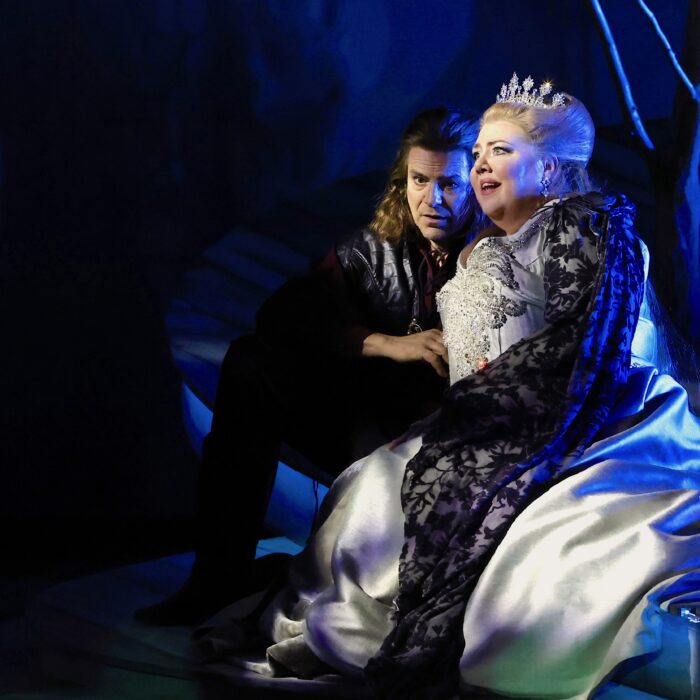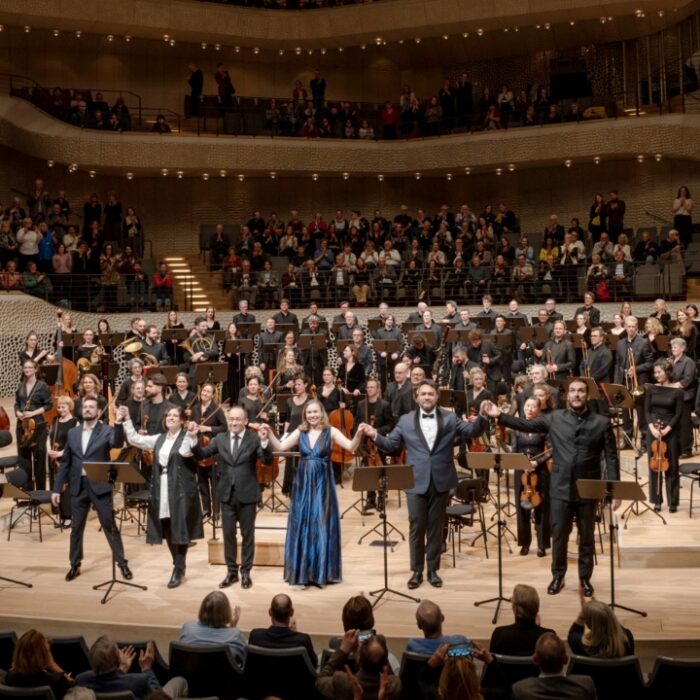
Opéra National de Paris 2022-23 Review: Roméo et Juliette
Benjamin Bernheim & Elsa Dreisig Shine in Disappointing Production
By João Marcos CopertinoWho’s afraid of “Roméo et Juliette?” Thomas Jolly, apparently.
The director, recognized for his work both on opera and Shakespeare, seems to have missed the emotion and aesthetic power in Gounod’s opera. Thankfully, the musicians have never sounded better.
First thing first: My distaste for Jolly’s approach to Gounod’s “Roméo et Juliette” does not deny that Jolly knows much more about Shakespeare and theater than most theater directors nowadays. His more or less conservative approach to stage “Romeo and Juliet”—no Regie theaters, no major subplots—shows the knowledgeable respect that Jolly has for great texts. That is a long way of saying: Thomas Jolly is very smart, but I really think he did not reach his own star in this “Roméo.”
A Broadway Musical?
This “Roméo” very much resembles a Broadway musical that, trying too hard to please the whole public, never gets to core of the drama itself. Nothing against Broadway musicals, but the aesthetic does not work in this context, making “Roméo” seem vulgar and shallow, depriving it of the pathos that the most famous love story of all time deserves from any treatment. Nor does the vulgarity achieve the sexual explicitness that might have been a form of compensatory interest.
The scenario is an intricate, grandiloquent set of stairs from Palais Garnier made frenetically to spin on stage like a laundry machine. Its synchrony with the action and lightning has some good moments—especially Roméo’s second-act aria, and Juliette’s fourth-act scene. Nevertheless, after the first act, it primarily gave me vertigo.
The light design explored the continuously foggy atmosphere of the scenario and often lit the audience more than the stage. The result was a vulgar aesthetic that was complemented by the costumes, which,though well-crafted, were something between Venetian carnival and Mexican lucha libre. Nevertheless, even my grudging? eyes appreciated the sober colors of Juliette’s wedding costumes, and Roméo’s second-act glittering suit —when my fancy removed the golden shoulder pads that must have been stolen from a forgotten gown by Bob Mackie.
Jolly feared to actually pursue the drama of “Roméo et Juliette” drama to full height of its dramatic consequences. There was a continuous sense of the pathetic that hindered the stage direction from eliciting anything other than indifference. Many elements were thrown on the stage without ever raising bigger points. That Verona, like the setting of many a great tragedy, is here in the midst of a plague is alluded to in the prelude but then makes not even a minimal difference for the rest of the opera staging.
In the program, Jolly alludes how Shakespearean oxymoron is explored on his concept of staging. I am not extremely sure on what he meant by it. Watching the opera, I did not find the proper use of the Shakesperean oxymoron that makes Juliet’s language so good “that almost freezes up the heat of life” (Act four). In Shakespeare’s, the figure of speech works in such way that the antonymic elements (freeze/heat) are not necessarily dialectical. There was some mention of it in making the couple wear black and white clothes, but it was a small gesture compared to the richness of the opera and the Shakespearean language that Jolly has explored with much success elsewhere.
Regardless of how great Elsa Dreisig and Benjamin Bernheim were musically—and they were great—the staging did them few favors and hardly served to make their musical chemistry compelling to see. Although they are both young singers, their costumes and makeup—especially in the first three acts—made them seem no younger than fifty. The staging gave no indication of any flame between them. In fact, scenically, Roméo had more chemistry with Mercutio.
The interesting aspect is that, if only because of its tackiness, Jolly’s staging was by all relevant measures polemic and radical. Had he been more traditional in the storytelling, or more radical, things would have been better. To my eyes, it was theatre afraid of itself.
Two Stars Uniting Amidst Messy Surroundings
If Jolly attempted to explore the idea of the Shakespearean oxymoron, the musical direction of Carlo Rizzi succeed in everything at which the stage didn’t. It is a disturbing pleasure to listen to great musicians thriving in a poor staging. The good thing about new productions is that the casting is usually impeccable. It is not that a revival lacks good casting, but usually there is a sense of chemistry between the singers in the brand-new scenarios that makes them all sound even better than usual.
I have heard few singers with greater musical chemistry than Elsa Dreisig and Benjamin Bernheim. Their voices blended well together, and they seemed to share similar instincts on where to go with the music. Their instruments blended in such a way that there was no competition at all. It was a beautiful sonic cooperation. Their mutual chemistry was there even when they were not singing together. There was often something of Dreisig in Bernheim’s phrases, and a souvenir of Bernheim in Dreisig’s high notes. The most cathartic moment of this, to me, was in the death scene, in which they both were very aware how to emulate musical gestures and dynamics when facing death.
Juliette, since its inception has been the home of the greatest French prima-donnas. The first Juliette, Marie Caroline Miolan-Carvalho, is one of those nineteenth-century opera stars whose voice’s qualities, so old in story, unfortunately preceded the advent audio recording. Dreisig is part of this star tradition, shining in her two arias with a light and fierce instrument. Her coloraturas are always marked by the great willfulness within Juliette’s spirit. It scarcely seems that Juliette is ever even minimally subordinated to anyone else. In her first aria, “Je Veux Vivre,” Dreisig survived an elaborate troupe of spinning dances and still managed to create a meaningful version of Juliette. There were no senseless dynamics; everything was clearly connected to the text. In her second aria, “Amour ramine mon courage,” she had much stamina and rhythmical control—even if I myself might have enjoyed a little bit more of lower resonance. Dreisig managed to move well between the more recitative parts of the aria and the refrain, making it all sound like part of a larger monologue.
Bernheim proves to be one of today’s most impressive French tenors. Roméo is no easy part, but Bernheim seems to surf smoothly over all possible difficulties of the part. Never have I heard a better French enunciation in Opéra Bastille, and never have I heard Bernheim’s voice more uniform. Even comparing the performance to my memories of his “Faust” last season, I think what was good then is now excellent. There were many moments that Bernheim explored his great voice, especially with great strength and even with some bravura during his arias; even more striking, I have never heard such a carefully sung pianissimo in the end of the second act duo (“Va ! repose en paix ! sommeille”). It was divinely sung, with the most solemn legato. Next to me I heard an operagoer sighing “Not even Corelli!” There is truth in these immediate impressions.
Brilliance All Around
Scenically speaking, Lea Desandre and Huw Montague Rendall seemed to be the only two that were having some fun on stage, managing to preserved a sense both of panache and irony, a combination that is essential to Shakespeare. It is such panache that makes the tragic moments more moving. That is particularly true when one sees the development of Rendall’s Mercutio. During his aria for queen Mab, he was all young and reckless—in the best sense of the word. However, in his death scene on the third act, nothing sounded more serious. The voice was, as always, proper to his role—being a baritone with a slightly lighter-than-usual instrument.
I personally believe that Desandre, at the young age of 29, has proven herself to be one of the greatest singers of her generation. Her incursions to the baroque repertoire are a must-have in any music-lover’s library. Entering the performance I was nevertheless a bit apprehensive about her singing Stéphano, a role a bit further into the nineteenth century than most of her repertoire. My fears were all for nothing. Desandre sang her song, “Que fais-tu, blanche tourterelle,” with all the flippancy possible. Her voice sounded fresh and light, her tempi—a bit slower than usual—were proper for showing the beauty and freshness of her tone. Stéphano—a younger cousin of Cherubino—was as enjoyable to hear as could be.
Anyone who searches for my other reviews of Laurent Naouri will see what a big fan I am of his work. Although Naouri has very high standards, his Capulet might not have been his strongest role so far. His first-act aria, “Allons! jeunes gens!” lacked a certain lower tonality, and the text was more chewed than uttered. Musically, Naouri is better developed in the fourth act—more sober voice, more fluidity in the text—, but even though he has elsewhere proven himself to be a great stage actor, his slapping of Juliette’s face prior to her marriage made any Mexican Telenovela cat-fight scene look like great acting.
Maybe less ironic than Mercutio and Stéphano, Maciej Kwaśnikowski’s Tybalt was tragic and choleric. His tenor voice seemed suitable for even bigger roles in future.
Jean Teitgen sounded extremely well as Frère Laurent. His voice had all the lower harmonics necessary and projected well in the small chapel downstairs.
Sylvie Brunet-Grupposo sings a solid Getrude with a good use of the spoken voice.
There were no loose ends or weak links in the supporting cast. And the orchestra sounded extremely well under the direction of Carlo Rizzi. Although the staging needs some reviewing, the quality of the vocal performances of this “Roméo et Juliette” Is undeniable.


